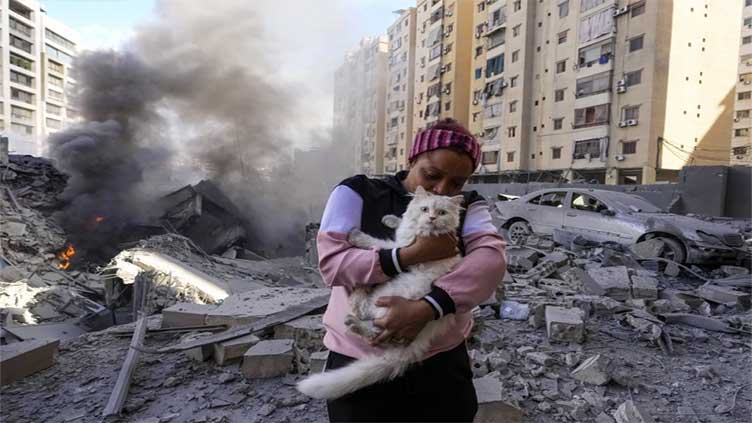What to know as Israel expands its operations in Lebanon

World
What to know as Israel expands its operations in Lebanon
NEW YORK (AP) - Israeli airstrikes hammered targets across southern Lebanon and Beirut’s suburbs while its military urged residents to flee more than two dozen Lebanese towns and villages, further signs that Israel is ramping up its operations in Lebanon.
Israel, which had been focused for nearly a year on its war against Hamas in the Gaza Strip, began escalating attacks more than two weeks ago against the Hezbollah militant group, which wields immense power across swaths of southern Lebanon and other parts of the country.
Earlier this week, Israeli forces began making what it calls limited ground incursions into southern Lebanon, amid fears that fighting could spread across the region. Iran launched a ballistic missile attack on Israel in retaliation for Israel’s assassination of Hamas and Hezbollah leaders, both militant groups that it supports, but it caused few casualties and little damage. Israel has vowed to retaliate.
“For your safety, you must evacuate your homes immediately,“ the Israeli military’s Arabic-language spokesperson, Avichay Adraee, warned on X. “Anyone who is near Hezbollah operatives, their facilities or their weapons, puts themselves at risk.”
Nearly 1.2 million people have been displaced from their homes in Lebanon because of the fighting, Lebanese officials said Thursday.
Israel has repeatedly targeted Beirut’s southern suburbs but a late Wednesday night airstrike on a central Beirut apartment killed nine people, including seven Hezbollah-affiliated civilian first responders, Lebanese officials said.
The apartment was not far from the United Nations headquarters, the prime minister’s office and parliament. Israeli airstrikes have hammered areas with a strong Hezbollah presence, but it has rarely struck the heart of the capital.
At least nine Israeli soldiers have been killed in clashes with Hezbollah in southern Lebanon during the fighting, which has so far been confined to a narrow border area. The Israeli military said Thursday that it had struck about 200 Hezbollah targets across Lebanon, killing at least 15 Hezbollah fighters.
Elsewhere Thursday, the Palestinian Health Ministry said 16 people were killed in an Israeli strike on the Tulkarem refugee camp in the West Bank, the deadliest strike in the occupied territory since the Israel-Hamas war erupted last year.
Hezbollah rocket attacks on Israel began just after Hamas launched a cross-border attack from the Gaza Strip on Oct. 7, 2023, killing 1,200 Israelis and taking 250 more hostage. More than 41,000 Palestinians have been killed since then in the Hamas-controlled Gaza Strip, according to the Gaza Health Ministry, which does not differentiate between fighters and civilians but says more than half were women and children.
What about the phosphorus bomb accusations?
Lebanon’s state-run news agency accused Israel of using phosphorus bombs in the central Beirut airstrike, a potential violation of international law.
The National News Agency provided no evidence, but residents reported a sulfur-like smell, a possible indication of the use of white phosphorus, a white-hot waxy substance that can set buildings on fire and burn human flesh to the bone. Survivors risk infections and organ or respiratory failure, even with small burns.
Human rights groups, which say it’s a crime under international law to fire the controversial munitions into populated areas, have in the past accused Israel of using white phosphorus incendiary shells in southern Lebanon.
The Israeli military in a statement did not confirm or deny using the substance in the strike in Beirut. It acknowledged possessing “smoke shells that include white phosphorus, which are lawful under international law.”
How are other countries reacting?
Countries around the world are urging their citizens to leave Lebanon, and some are arranging evacuations to get them to safety.
A ship that left Lebanon carrying more than 300 foreign nationals docked Thursday in the Turkish city of Mersin, the Turkish news agency IHA reported, the third such ship to arrive there in recent days.
Roughly 250 Americans and their immediate families have left Lebanon in the past two days on government-organized contract flights, U.S. officials said Thursday. The State Department said the U.S. Embassy in Beirut can provide emergency loans to Americans who wish to leave Lebanon on U.S.-contracted flights.
Ticket costs have jumped in recent days as commercial carriers stopped flying into the country. Lebanon’s Middle East Airlines is now the only commercial airline operating international flights.
Spain, Italy and Colombia are among the nations sending planes to evacuate their citizens, officials said. Japan has dispatched two military aircraft to the region to prepare for a possible airlift. More than 100 Colombians returned home Thursday on a flight arranged by the government.
Australia has booked 500 seats on commercial aircraft for its citizens, officials said, and the British government, which has already flown out some U.K. nationals, has chartered more flights.
What will the response be to Iran’s missile attack?
Top Israeli and U.S. officials have been discussing possible responses to Iran’s ballistic missile attack, according to a U.S. defense official.
U.S. Joint Chiefs Chairman Gen. CQ Brown Jr. spoke with Israeli military’s chief, Lt. Gen. Herzi Halevi, on Wednesday, Pentagon spokesperson Sabrina Singh said Thursday. She said U.S. Defense Secretary Lloyd Austin has held “almost daily” conversations with Israeli Defense Minister Yoav Gallant since the attacks.
“We are discussing with them what a response to Iran should look like,” she said. “I certainly think any response, we will be part of those discussions.”
___


